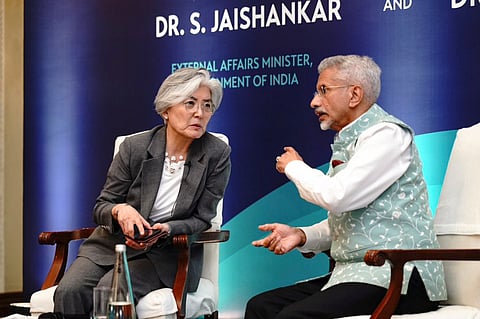

NEW DELHI: External Affairs Minister S. Jaishankar said on Wednesday that relations between India and China have seen progress since October 2024, with both nations actively working to address various aspects of their bilateral ties that were impacted by past tensions.
In a conversation with Kyung-wha Kang from the Asia Society, Jaishankar highlighted that both countries are attempting to reverse some of the damage caused by actions taken in 2020 and rebuild their diplomatic relationship. He pointed out that, despite historical challenges, there has been progress in managing their ties over the years.
Reflecting on the history of India-China relations, Jaishankar noted that the two nations had a strained relationship following the 1962 war. He said it took India 14 years to send an ambassador back to China and another 12 years before an Indian Prime Minister visited Beijing.
However, from 1988 onwards, the two countries gradually rebuilt their relationship based on mutual understanding, even though the boundary issue remained unresolved.
Jaishankar stressed that, despite incidents along the border, the two nations had not seen bloodshed for over four decades until 2020. He recalled the 2020 border standoff in eastern Ladakh, which began due to Chinese military actions and led to heightened tensions between the two countries. This standoff, marked by military deployments and confrontations, became a turning point in bilateral relations.
Describing the incident as traumatic, Jaishankar said it was not just the loss of lives but also China's disregard for previously agreed-upon terms that damaged the relationship. He stressed that the sharp deviation from these agreements was significant.
Despite the tensions, Jaishankar said India sought a negotiated solution to the standoff. He stated that the period of heightened hostility did not benefit either country.
“How do we benefit from having a tense relationship, with large numbers of troops on both sides and the collateral damage to our overall relationship?" he asked. He argued that the disturbance of peace along the border disrupted other aspects of their ties and made cooperation more difficult.
Jaishankar reiterated India's stance that differences between the two nations should not turn into disputes and that competition should not escalate into conflict.
While acknowledging that India and China will continue to have differences in the foreseeable future, he stressed that such issues could be addressed without resorting to aggressive actions. "What happened in 2020 was not the way to address these issues," he stated.
Prime Minister Narendra Modi and Chinese President Xi Jinping also met on the sidelines of the 16th BRICS Summit in Kazan on 23 October 2024.
During their meeting, Modi welcomed the agreement for complete disengagement and resolution of issues arising from the 2020 border tensions, underscoring the importance of managing differences and ensuring peace and tranquillity along the border.